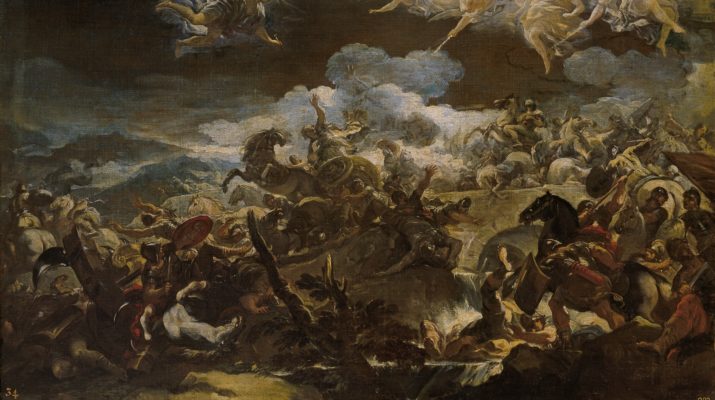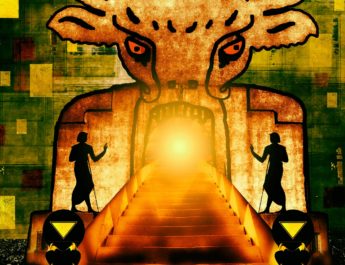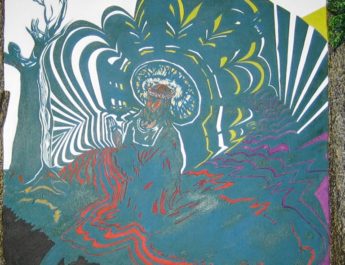Psalm 83
A Song. A PsalmI of Asaph.II
1 O God,III do not keep silence;IV
do not hold your peaceV or be still,VI O God!VII
I “Psalm” = mizmor. From zamar (making music; used specially of music to worship God; music with singing, singing praise, singing psalms); may be from zamar (to trim or prune). This is a melody or a psalm.
II “Asaph” = Asaph. From asaph (to gather, assemble, bring, take away, destroy, or remove). This is Asaph, meaning “gatherer” or “collector.” It is a personal name.
III “God” = Elohim.
IV “keep silence” = domi. 4x in OT. From damah (to be silent, to cease, destroy, perish). This is a pause or rest. It could also be a cutting off.
V “hold…peace” = charash. This is to scratch, which implies etching or plowing. It can mean to manufacture regardless of materials used. Figuratively, it can be to devise or conceal. It can also have a sense of secrecy. Hence, being silent or left alone. It can also be speechless.
VI “be still” = shaqat. This is to be quiet, rest, calm, settle, be still, peace.
VII “God” = El. Related to “God” in v1. See note III above.
2 Even nowVIII your enemiesIX are in tumult;X
those who hateXI you have raisedXII their heads.XIII
VIII {untranslated} = hinneh. From hen (lo! Behold! If, though; an expression of surprise). This is to draw attention, show suddenness or surprise, or to emphasize the importance of the coming statement. See! Lo! Behold!
IX “enemies” = oyeb. From ayab (to hate or be hostile to). This is a foe or enemy as one that you are hostile to.
X “are in tumult” = hamah. This is to growl or roar, be disturbed, mourn, yearn. It is being noisy so it can imply tumult, rage, war.
XI “hate” = sane. This is an enemy or foe. It is one that is hated with a personal hatred.
XII “raised” = nasa. This is to lift in a broad sense, literally and figuratively. So it could be to carry, take, or arise. It could also be bring forth, advance, accept.
XIII “heads” = rosh. This may come a word that means to shake. It is the head, captain, or chief. It can also be excellent or the forefront. It can be first in position or in statue or in time (i.e. the beginning).
3 They lay craftyXIV plansXV against your people;XVI
they consult togetherXVII against those you protect.XVIII
XIV “lay crafty” = arom. 4x in OT. This is to be cunning or shrewd. Properly, it has to do with laying bare, making smooth. It is often craftiness in a negative way.
XV “plans” = sod. Perhaps from yasad (to establish, appoint, instruct; to set in a literal or figurative sense; also, to sit down together and so to consult or take counsel). This is a session, counsel, or assembly. It can also mean a consultation.
XVI “people” = am. From amam (to darken, hide, associate; creating shadows by huddling together). This is people or nation. It can be used specifically for a tribe, collectively of troops or armies, or figuratively to refer to a flock of animals.
XVII “consult together” = yaats. This is to advise, counsel, consult, decide, plan, purpose, or determine. It can also have a negative sense of conspire or devise.
XVIII “protect” = tsaphan. This is to hide something by covering it. It implies hoarding or keeping something in reserve. It can mean to protect or to lurk.
4 They say, “Come,XIX let us wipe them outXX as a nation;XXI
XIX “come” = halak. This is go, come, walk. It is walk literally and figuratively and includes people and animals. It can be used figuratively for one’s moral life – how we walk according to God’s way or against it. It can also refer to the walk of life as in the course one’s life takes, the choices we make, etc.
XX “wipe…out” = kachad. This is to hide or conceal or destroy. It can also refer to doing secret actions or secret speech.
XXI “nation” = goy. From the same root as gevah (the back, person, or body); related to gev (among); related to gaah (to rise up). This is nation or people. Often used to refer to Gentiles or foreign nations. It can also be used figuratively for a group of animals. This is where the Yiddish “goy” comes from.
let the nameXXII of IsraelXXIII be rememberedXXIV no more.”
XXII “name” = shem. May be from sum (to put, place, set). This is name, fame, renown. A name was thought to indicate something essential about a person – something about their individuality. So, this word can also mean honor, authority, or character.
XXIII “Israel” = Yisrael. Related to “God” and “God” in v1. From sarah (to persist, exert oneself, contend, persevere, wrestle, prevail) + el (see note VII above). This is Israel, meaning God strives or one who strives with God; new name for Jacob and for his offspring. This refers to the people and to the land.
XXIV “remembered” = zakar. This is to remember, to mark something so that it can be recalled, to be mindful of, to mention.
5 They conspireXXV with oneXXVI accord;XXVII
against you they makeXXVIII a covenantXXIX—
XXV “conspire” = yaats. Same as “consult together” in v3. See note XVII above.
XXVI “one” = yachad. From yachad (to join, be united). This is a unit, both, altogether, unitedness, alike.
XXVII “accord” = leb. May be related to labab (to encourage; properly, to be encased as with fat; used in a good sense, this means to transport someone with love; used in a bad sense, it can mean to dull one’s senses). This is the heart, courage, one’s inner self, the mind, or the will. Heart is only used in a figurative sense in the Old and New Testaments.
XXVIII “make” = karat. This is to cut down, cut off, or make a covenant (idiom for making a covenant is “to cut a covenant”). It can also mean to destroy, fail, or consume.
XXIX “covenant” = berit. Perhaps from barah (to eat, choose, make clear); perhaps from bar (grain, wheat); from bara (to select, purify, cleanse, test, brighten, polish). This is a compact, covenant, alliance, treaty, or league.
6 the tentsXXX of EdomXXXI and the Ishmaelites,XXXII
MoabXXXIII and the Hagrites,XXXIV
XXX “tents” = ohel. Perhaps from ahal (to shine, be clear). This is a tent, covering, home, or side pillar.
XXXI “Edom” = Edom. From the same as adom (to be red or flushed). This is Edom or Idumaea. It means red.
XXXII “Ishmaelites” = Yishmeeli. Related to “God” and “God” in v1 & “Israel” in v4. 8x in OT. From Yishmael (Ishmael, meaning “God hears” or “God will hear”); {from shama (hear, call, consent, or consider; implies listening intelligently, giving attention; obedience and action are often implied) + el (see note VII above)}. This is Ishmaelite.
XXXIII “Moab” = Moab. May be from ab (father, ancestor, grandfather; father in a literal or figurative sense). This is Moab or Moabite. Name could mean “from her father” in reference to the incestuous relationship between Lot and his daughters. The name could also mean, more pleasantly, “seed of a father” or “desirable land.” See https://en.wikipedia.org/wiki/Moab
XXXIV “Hagrites” = Hagri. 6x in OT. From Hagar (Hagar, a name meaning “flight” or “to be dragged off” or “pressed into service” or “sojourner”); {perhaps from hagar (fleeing; a stranger or foreigner)} OR from ha (the) + garar (to drag out or away) OR from Persian/Greek aggareuo (to press into service). This is Hargite or Hagri – someone who is a member of this tribe as well as a personal name. Seehttps://www.abarim-publications.com/Meaning/Hagar.html#.Xh-BtUdKhPY and https://en.wiktionary.org/wiki/Hagar
7 GebalXXXV and AmmonXXXVI and Amalek,XXXVII
XXXV “Gebal” = Gebal. 1x in OT. From Gebal (Gebal; a Phoenician twn); from the same as gebul (boundary, limit, coast, space; properly, a line that is twisted, which implies a boundary and, by extension, the boundaries of a territory or other enclosed space); perhaps from gabal (to border, twist like rope). This is Gebal, a region in Idumea.
XXXVI “Ammon” = Ammon. Related to “people” in v3. From im (with, against, before, beside); perhaps from amam (see note XVI above) OR from am (see note XVI above). This is Ammon or Ammonites. It is a tribe whose name mean “tribal” or, unkindly “inbred.”
XXXVII “Amalek” = Amaleq. Perhaps from amal (to work – hard labor) OR from am (people or nation; a tribe, troops or armies, or figuratively to refer to a flock of animals); {from amam (to darken, hide, associate; creating shadows by huddling together)} + laqaq (to lap, lick) OR from am (see above) + malaq (to wring, nip; to remove a bird’s head). This is Amalek or Amalekite. It may mean “people that wring,” “people that lap,” “nippers,” or “lickers.” See https://www.abarim-publications.com/Meaning/Amalekite.html & https://www.abarim-publications.com/Meaning/Amalek.html
PhilistiaXXXVIII with the inhabitantsXXXIX of Tyre;XL
XXXVIII “Philistia” = Pelesheth. 8x in OT. From palash (to mourn, wallow, maybe roll in). This is Philistia, which may mean “griever” or “burrower” or “weakener.” See https://www.abarim-publications.com/Meaning/Philistine.html.
XXXIX “inhabitants” = yashab. This is to sit and so to remain and so to dwell. It is sitting for any reason – as a judge, in order to ambush, or just sitting quietly. Causatively, this can mean settling or marrying. This can also mean continue, endure, or establish.
XL “Tyre” = Tsor. “From Phoenician “?? (ṣr /Ṣur/, “rock”)”” OR from the same as tsor (flint, stone, knife, edge); from the same as tsar (pebble, flint) or tsur (to confine, cramp, or bind in a literal or figurative sense; to besiege, assault, or distress). This is Tyre, the Phoenician city. Its name may mean “rock.” See https://en.wiktionary.org/wiki/Tyre
8 AssyriaXLI also has joinedXLII them;
they areXLIII the strong armXLIV of the childrenXLV of Lot.XLVI SelahXLVII
XLI “Assyria” = Ashshur. From Akkadian Ashshur (“City of God Ashshur”) OR related to Hebrew ashar (to go straight, advance, proceed, direct, guide, be level, be honest, be blessed or happy). This is Assyria, referring to the place and its inhabitants. It is also a name – Ashshur, a descendant of Shem. See https://en.wikipedia.org/wiki/Assyria#Nomenclature.
XLII “joined” = lavah. This is to join, abide with, borrow. Properly, it means to twine, which gives it the sense of joining or uniting. It can also mean to remain or borrow/lend as joining an obligation to another. This root may be where the name/tribe Levi comes from.
XLIII “are” = hayah. This is to be or become, to happen.
XLIV “strong arm” = zeroa. Perhaps from zara (to sow, scatter seed, conceive). This is the arm, shoulder, or foreleg of an animal. It is figuratively used for power, force, might, or help.
XLV “children” = ben. From banah (to build or obtain children). This is son, age, child. It is son in a literal or figurative sense.
XLVI “Lot” = Lot. From the same as lot (envelope, veil); from lut (to wrap, envelop). This is Lot, “covering.”
XLVII “Selah” = Selah. From salal (to lift up, build, pile, extol, exalt; can also be used for opposing as a dam holds back water). This is to lift up or exalt. Also, “selah” in the psalms where its precise meaning is uncertain. It could be a pause in the music, a moment of silence. It could signal a change in the service or mean something akin to amen.
9 DoXLVIII to them as you did to Midian,XLIX
as to SiseraL and JabinLI at the WadiLII Kishon,LIII
XLVIII “do” = asah. This is to make, do, act, appoint, become in many senses.
XLIX “Midian” = Midyan. From the same as madon (strife, contention, brawling); from din (to judge, defend, dispute, govern, strive). This is Midian or a Midianite. It means strife or place of judgment.
L “Sisera” = Sisera. Perhaps from Hittite verb (to meditate) OR related to sus (root may mean to skip as in jump for joy; a crane or a swift bird; a horse as leaping) + raah (to see, show, stare, think, view; to see in a literal or figurative sense). This is Sisera, perhaps meaning “meditation, “keen and swift,” or “see the horse.” See https://www.abarim-publications.com/Meaning/Sisera.html#.X2FO22hKhPY
LI “Jabin” = Yabin. 8x in OT. From bin (to discern, consider, attend to; distinguishing things in one’s mind or, more generally, to understand). This is Jabin or Yabin meaning “one who is intelligent.”
LII “Wadi” = nachal. From nachal (to take as heritage, inherit, or distribute). This is a river or stream. It could be a wadi or arroyo – sometimes a narrow valley with no water at all, but in strong rains or when winter snow melts, it swells or floods with water.
LIII “Kishon” = Qishon. 6x in OT– regarding this incident and Elijah’s contest with the priests of Baal in 1 Kings 18. From qush (to ensnare, bend, set a trap); perhaps from yaqosh (ensnare, lay bait, lure, trapper; to snare literally or figuratively). This is Kishon or Qishon, meaning “winding.”
10 who were destroyedLIV at En-dor,LV
who becameLVI dungLVII for the ground.LVIII
LIV “destroyed” = shamad. This is to demolish, destroy, perish, overthrow, pluck down.
LV “En-dor” = En-dor. 3x in OT. From Ayin (Ain; a place whose name means “spring” or “fountain”); {from the same as ayin (eye, appearance; eye in a literal or figurative sense; a fountain)} + dor (a revolution of time, which is to say, an age or generation; a dwelling or one’s posterity); {from dur (to move in a circle, which implies living somewhere or remaining there; it can also be the sense of piling or heaping up)}. This is En-dor, a town whose name means “spring of dwelling.”
LVI “became” = hayah. Same as “are” in v8. See note XLIII above.
LVII “dung” = domen. 6x in OT. This is dung or manure.
LVIII “ground” = adamah. From the same as adam (man, humankind); perhaps from ‘adom (to be red). This is ground, earth, soil as red, or land.
11 MakeLIX their noblesLX like OrebLXI and Zeeb,LXII
LIX “make” = shith. This is to place, set, bring, appoint, consider, bring, array or look.
LX “nobles” = nadib. From nadab (to offer willingly, volunteer, freely give, be willing). Properly, this is voluntary and so it implies generous, noble, magnanimous, or a generous person.
LXI “Oreb” = Oreb. 7x in OT. From the same as ereb (evening, night, twilight); {from arab (to grow dark, become gloomy)} OR from the same as oreb (a raven); {from arab (see above)}. This is Oreb, a personal name and the name of a cliff.
LXII “Zeeb” = Zeeb. 6x in OT. From the same as zeeb (a wolf; from a word that may refer to being yellow). This is Zeeb, a personal name that means “wolf.”
all their princesLXIII like ZebahLXIV and Zalmunna,LXV
LXIII “princes” = nsiyk. 6x in OT. From nasak (to pour out or melt; used especially for libations or for the process of making cast metal; can also be used figuratively for anointing a king). This is a drink offering idol made of poured metal, or a leader as a anointed one.
LXIV “Zebah” = Zebach. 12x in OT. From zabach (to kill, slay, offer; slaughtering an animal to offer as a sacrifice). This is Zebah, a name meaning “sacrifice” or “victim.” Seehttps://www.abarim-publications.com/Meaning/Zebah.html
LXV “Zalmunna” = Tsalmunna. 12x in OT. From the same as tselem (phantom, resemblance, illusion, image, idol) OR from tsel (shade in a literal or figurative sense; shadow, shade, protection, shelter, or defense); {from tsalal (to be or become dark, shade; this is the shade as during twilight or shadow as associated with something opaque)} + mana (to hold back, refuse, restrain, deny in a positive or in a negative sense). This is Zalmunna or Tsalmunna, a name that means “shade has been denied” or “shadow is withheld” or “deprived of shade.” See https://www.abarim-publications.com/Meaning/Zalmunna.html
12 who said, “Let us take the pasturesLXVI of GodLXVII
for our own possession.”LXVIII
LXVI “pastures” = naah. 12x in OT. From the same as naveh (home, place where shepherd or sheep live; at hme implies a lovely place or a place of satisfaction); from navah (home, beautify, praise) OR from naah (to be at home and so pleasant, beautiful). This is a home, pleasant place, or pasture.
LXVII “God” = Elohim. Same as “God” in v1. See note III above.
LXVIII “take…for our own possession” = yarash. This is inheriting or dispossessing. It refers to occupying or colonizing – taking territory by driving out the previous inhabitants and living there instead of them. By implication, it can mean to seize or rob, to expel, ruin, or impoverish.
13 O my God,LXIX make them like whirling dust,LXX
like chaffLXXI beforeLXXII the wind.LXXIII
LXIX “God” = Elohim. Same as “God” in v1. See note III above.
LXX “whirling dust” = galgal. 11x in OT. From galal (to roll, roll away, wallow, commit, remove; rolling in a literal or figurative sense). This is wheel, wagon, whirl, whirlwind; something that rolls.
LXXI “chaff” = qash. 16x in OT. Perhaps from qashah (this is to gather stubble or forage for it, to gather, straw or wood; figuratively, to gather people, assemble). This is dry straw, chaff, stubble.
LXXII “before” = paneh. From panah (to turn, face, appear). This is face in a literal or figurative sense. It could be face, presence, anger, respect. It can also be used of God to indicate divine favor or presence.
LXXIII “wind” = ruach. This is breath, wind, air, cool, spirit. This is wind, which resembles the breath and so this can be used figuratively for life itself or being frail/mortal/impermanent. It can refer to the air of the sky or the spirit.
14 As fireLXXIV consumesLXXV the forest,LXXVI
as the flameLXXVII sets the mountainsLXXVIII ablaze,LXXIX
LXXIV “fire” = esh. This is fire, burning, flaming, hot. It is fire in a literal or figurative sense.
LXXV “consumes” = ba’ar. This is to burn, consume, heat, remove. It can also be to consume by a fire or through eating, being brutish or wasting.
LXXVI “forest” = ya’ar. This is honeycomb, forest, thicket. Root may mean thick with green growth. It is a forest as a place where one would find honeycomb.
LXXVII “flame” = lehabah. 19x in OT. From lahab (flame, flashing, bright; figuratively, a blade or the point of a spear). This is a flame, blazing, head of a spear.
LXXVIII “mountains” = har. From harar (hill or mountain). This is mountain, hill, hilly region.
LXXIX “sets…ablaze” = lahat. 11x in OT. This is to set on fire, burn, kindle, be ablaze, consume.
15 soLXXX pursueLXXXI them with your tempestLXXXII
and terrifyLXXXIII them with your hurricane.LXXXIV
LXXX “so” = ken. Perhaps from kun (properly, in a perpendicular position; literally, to establish, fix, fasten, prepare; figuratively, it is certainty, to be firm, faithfulness, render sure or prosperous). This is to set upright. Generally used figuratively to mean thus, so, afterwards, rightly so.
LXXXI “pursue” = radaph. This is to chase after, pursue, hunt, or persecute. It is running after someone or something, generally with hostile motives.
LXXXII “tempest” = saar. From sa’ar (to storm, scattered by a storm, blow away, rage, storm tossed; this is to toss in a literal or figurative sense). This is a storm or whirlwind. It can also be stormy.
LXXXIII “terrify” = bahal. To be afraid or dismayed or amazed. This is deep trembling within. So, figuratively, it refers to being suddenly agitated. This implies moving or acting quickly/anxiously.
LXXXIV “hurricane” = suphah. 16x in OT. From suph (to cease, snatch away, consume, remove). This is a sea, perhaps the Red Sea. It can also be used for a hurricane or the wind of a storm. Also, there is a place called Suphah.
16 FillLXXXV their facesLXXXVI with shame,LXXXVII
so that they may seekLXXXVIII your name, O Lord.LXXXIX
LXXXV “fill” = male. This is fill, satisfy, replenish, accomplish, fulfill, confirm, or consecrate. It is fill in a literal or figurative sense.
LXXXVI “faces” = paneh. Same as “before” in v13. See note LXXII above.
LXXXVII “shame” = qalon. 17x in OT. From qalah (to be held in low regard, dishonored, inferior, to hate; also, to be light – moving quickly). This is dishonor, shame, confusion. It can also refer to genitals.
LXXXVIII “seek” = baqash. This is to seek, ask, desire, or request. It can be any kind of searching. It can also mean to worship or pray – implies a striving for.
LXXXIX “Lord” = YHVH. Related to “are” in v8. From havah (to be, become) or hayah (see note XLIII above). This is the name of the God of Israel, the self-existent and eternal one, the tetragrammaton. This pronunciation has been lost to time so “Lord” is generally used in its place.
17 Let them be put to shameXC and dismayedXCI forever;XCII
let them perishXCIII in disgrace.XCIV
XC “be put to shame” = bosh. Properly, this means to be pale, which implies shame, disappointment, or confusion.
XCI “dismayed” = bahal. Same as “terrified” in v15. See note LXXXIII above.
XCII “forever” = ad + ad. Ad is from adah (to advance or continue; to take away or remove; adorning oneself with ornaments). This is old, perpetuity, eternity. It is a duration going back or forward.. Second ad is from the first ad (see above). This is until or as far as.
XCIII “perish” = abad. To wander off, lose self. This implies to perish, destroy, die, vanish, or be broken or corrupt.
XCIV “in disgrace” = chapher. 17x in OT. Perhaps from the same as chaphar (properly to pry into; to dig search for, sink, or explore). This is to be ashamed, disgraced, embarrassed, confounded – to blush.
18 Let them knowXCV that you alone,XCVI
whose name is the Lord,
are the Most HighXCVII over all the earth.XCVIII
XCV “know” = yada. This is to know, acknowledge, advise, answer, be aware, be acquainted with. Properly, this is to figure something out by seeing. It includes ideas of observation, recognition, and care about something. It can be used causatively for instruction, designation, and punishment.
XCVI “alone” = bad. From badad (to divide or be separated; alone, solitary, lonely, isolated, straggler). This is apart, alone, separation, body part, tree branch, except. It can also be a city’s chief.
XCVII “Most High” = Elyon. From alah (to go up, ascend, be high, be a priority; to arise in a literal or figurative sense). This is most high, upper. It refers to elevation – so, lofty.
XCVIII “earth” = erets. Root may mean to be firm. This is earth, ground, field land, or country.
Image credit: “The Defeat of Sisera” by Luca Giordano, circa 1692.




